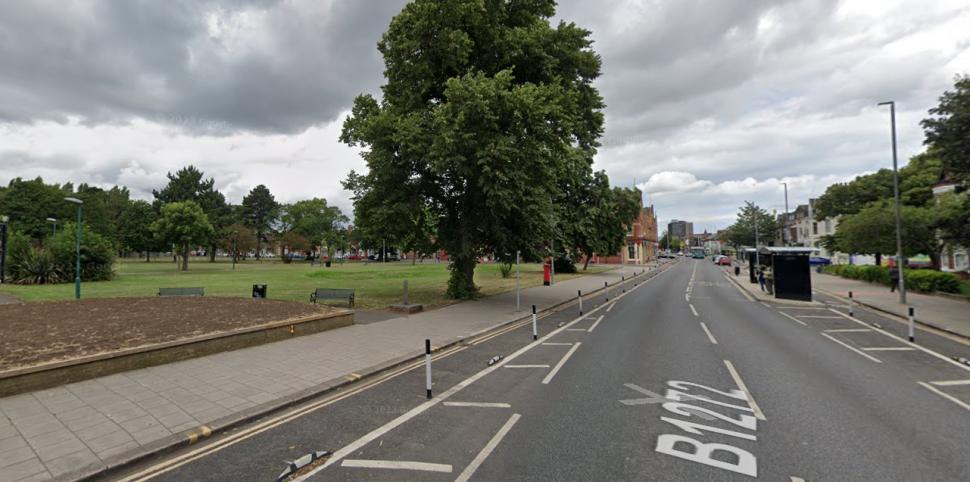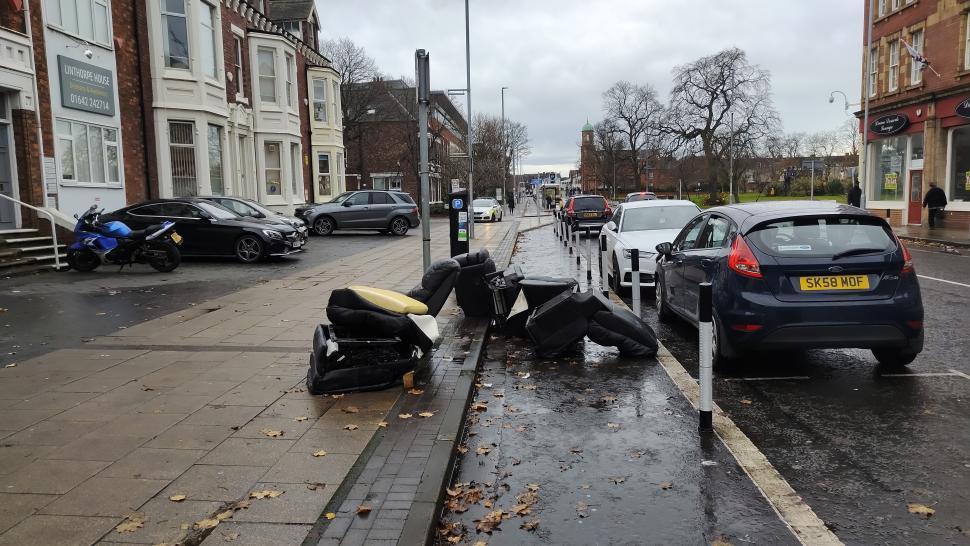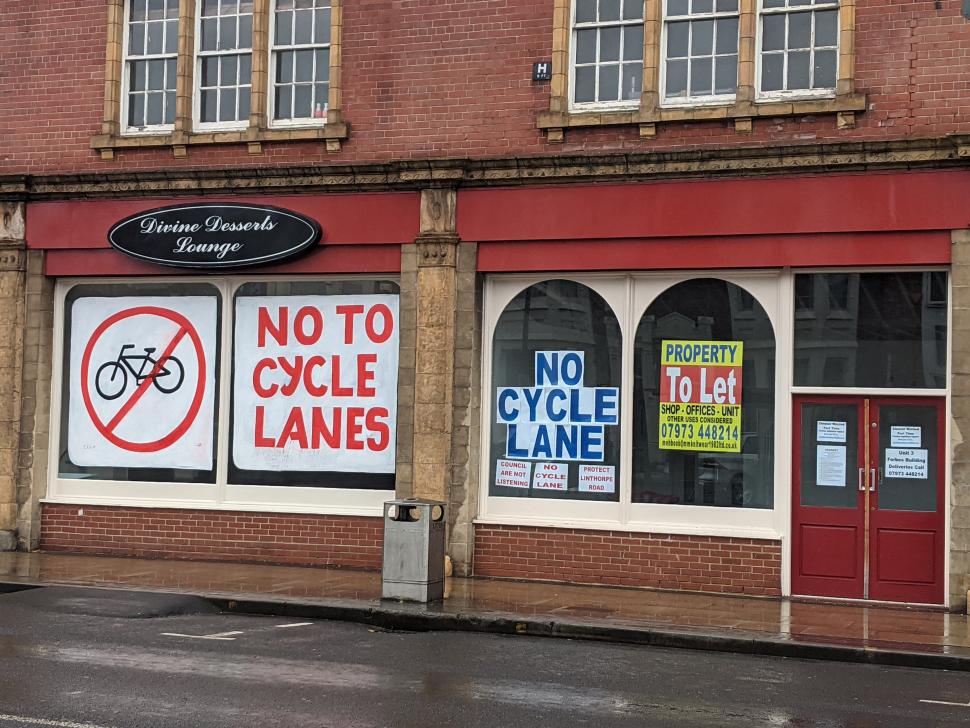Middlesbrough’s Linthorpe Road cycle lane – the centre of one of the UK’s longest-running and most controversial cycling infrastructure sagas of recent years – is finally set to meet its end in a few weeks, with work to rip out the much-derided protected lane scheduled to begin on 26 August.
The contentious, “hated” cycle lane’s impending removal, however, hasn’t prevented one of the local mayors at the heart of the saga from aiming a few final digs in its direction.
According to Tees Valley Mayor Ben Houchen this week, the Linthorpe Road bike lane was largely used by drug dealers and children “causing problems” – despite new figures revealing that since its installation in 2022, the percentage of cyclist injuries on the road dropped by half, while the number of cyclists using the road increased by 70 per cent.
Last month, we reported that Middlesbrough’s Labour mayor Chris Cooke confirmed that the protected cycle lane on Linthorpe Road would be ripped out at the end of August to the tune of £2.17m, bringing an end to over three years of bizarre shoplifting-themed complaints, a series of injuries, opposition from furious local business owners, and political spats fought out over social media.
However, this week Cooke revealed that several other road safety features which were introduced as part of the active travel scheme will remain following the lane’s removal. This means the pedestrian crossing installed at the same time as the bike lane will be retained, along with the road’s 20mph speed limit.
Cooke also confirmed that some side streets off Linthorpe Road will remain closed to motor vehicles, and the road narrowing measures introduced to make way for the bike lane will also stay. This road narrowing at junctions will be kept to help reduce vehicle speed and pedestrian crossing distances, Middlesbrough Council said.
 Linthorpe Road, Middlesbrough July 2023 (credit: Google Maps)
Linthorpe Road, Middlesbrough July 2023 (credit: Google Maps)
“We’re still committed to encouraging active travel, including walking and cycling, but they need to be the right schemes in the right places,” Cooke said in a statement confirming the date of the lane’s removal.
Meanwhile, his Tees Valley counterpart, Conservative politician Ben Houchen – who has clashed repeatedly with Cooke over the timing of the lane’s scrapping, and how it should be funded – told BBC Radio Tees this week that the cycle lane was largely used by children “causing problems” and drug dealers who took advantage of it as a “bike run to be able to get through traffic”.
Houchen’s claim that the bike lane was mostly used by drug dealers making quick, segregated getaways echoed the doom-laden predictions made by local businessowners before the infrastructure was even installed, who said it would enable shoplifters and other criminals to flee from police.
And while there are no figures to back up these claims that the Linthorpe Road cycle lane has become a haven for Middlesbrough’s drug dealers, the BBC also reported this week that it has, in fact, contributed to fewer injuries for people on bikes on the road.
In response to a Freedom of Information request lodged by the broadcaster, Middlesbrough Council revealed a smaller proportion of injuries on Linthorpe Road had involved cyclists after the bike lane was installed compared to previous years.
The council said that between 2015 and 2021 there were 57 injuries on the road, of which 23 per cent (14) involved cyclists.
But between 2022 and 2024, after the cycle lane was added, just 12 per cent (three) of the 26 injuries recorded were people on bikes.
Meanwhile, data published by the council last year showed that the protected cycle lane, for all its faults, contributed to the number of cyclists using the road increasing by 70 per cent, at the same time injuries were falling.
But despite the apparent success of the scheme in purely cycling terms, this month’s removal will finally bring end to over two years of acrimony and accusations surrounding one of the UK’s most contentious stretches of active travel infrastructure.
Back in 2022, before the project – approved by the North Yorkshire town’s former independent mayor Andy Preston – was even completed, traders on the street raised concerns about car parking for customers, along with (as noted above) the scheme’s potential to act as a getaway lane for shoplifters and drug dealers.
.jpg) Orca lane divider (image via North East Motorcycle Action Group) (credit: road.cc)
Orca lane divider (image via North East Motorcycle Action Group) (credit: road.cc)
Once installed, the low Orca dividers initially introduced to separate the bike lane from traffic through ‘light’ segregation were almost immediately condemned for creating a safety hazard for cyclists and pedestrians, while also failing to deter motorists from illegally driving or parking in the cycle lane.
In October 2022, cyclist Paul Harris – who was hospitalised after being hitting one of the Orca separators – claimed that the layout forced people on bikes to “constantly” dodge parked cars, buses, and pedestrians, and that a comprehensive overhaul of the lane was required “before someone gets killed”.
The 50-year-old’s nasty spill came less than two months after a 78-year-old woman was left with a broken wrist, a black eye, and concussion after tripping over one of the bike lane markers on the same road, while a 27-year-old fractured her elbow on a night out while crossing the lane.
Despite the council addressing these safety concerns by replacing the Orcas with wands, and then-mayor Preston scrapping plans for the cycle lane’s extension, the infrastructure has since proved a tense, and often messy, political battleground.
 Linthorpe Road cycle lane flytipping (credit: road.cc reader)
Linthorpe Road cycle lane flytipping (credit: road.cc reader)
Labour’s Cooke, who replaced Preston as Middlesbrough’s mayor in 2023, made the cycle lane’s removal a key part of his election campaign, claiming it had “caused nothing but injury and mayhem”.
However, he quickly came under pressure from residents and political opponents for his “abysmal failure” to immediately rip out the lane, with Cooke claiming that the works would go ahead once the necessary funds were available.
Tees Valley mayor Houchen also then publicly criticised Cooke’s apparent dithering, claiming that “others have promised and failed” to remove the bike lane. But in early 2024, in an abrupt about-turn, the two feuding mayors united after reaching an agreement to rip out the “unpopular” infrastructure.
 Labour mayor Chris Cooke and Conservative mayor Ben Houcham celebrate removal of Middlesbrough cycle lane, Linthorpe Road (credit: Tees Valley Combined Authority)
Labour mayor Chris Cooke and Conservative mayor Ben Houcham celebrate removal of Middlesbrough cycle lane, Linthorpe Road (credit: Tees Valley Combined Authority)
However, in yet another twist, that brief anti-cycle lane détente was later shattered after Houchen claimed that – despite Tees Valley Combined Authority being ready “to put spades in the ground” after agreeing to fund the project – the ongoing delays to the works were a result of Middlesbrough Council recommending that the cycle lane be kept.
Houchen claimed that Middlesbrough Council “ignored local people” by recommending that the infrastructure should, in fact, remain in place, despite a majority of residents – 75 per cent, according to Houchen – supporting plans to reinstate the previous layout in a consultation carried out last August.
However, despite the recommendation from council officers that plans to remove the cycle lane should be scrapped, Cooke said “it has always been my intention to overrule any such recommendations”, which he said contradicted the wishes of locals, and that Houchen was “evading his responsibilities” to fund the lane’s removal.
Things finally came to a head last December, when Middlesbrough Council approved the plans to remove the lane, with TVCA agreeing to fund the works. In July, the authorities confirmed, after months of delays, that the removal process would begin later this month, bringing an end, as Houchen said, to “this sorry chapter for Middlesbrough”.
“It is about time, and we can finally turn the page on this sorry chapter for Middlesbrough. I said I’d sort it for the council, and it is going. Let’s get it ripped out, and let local businesses get back to their lives,” he said.

